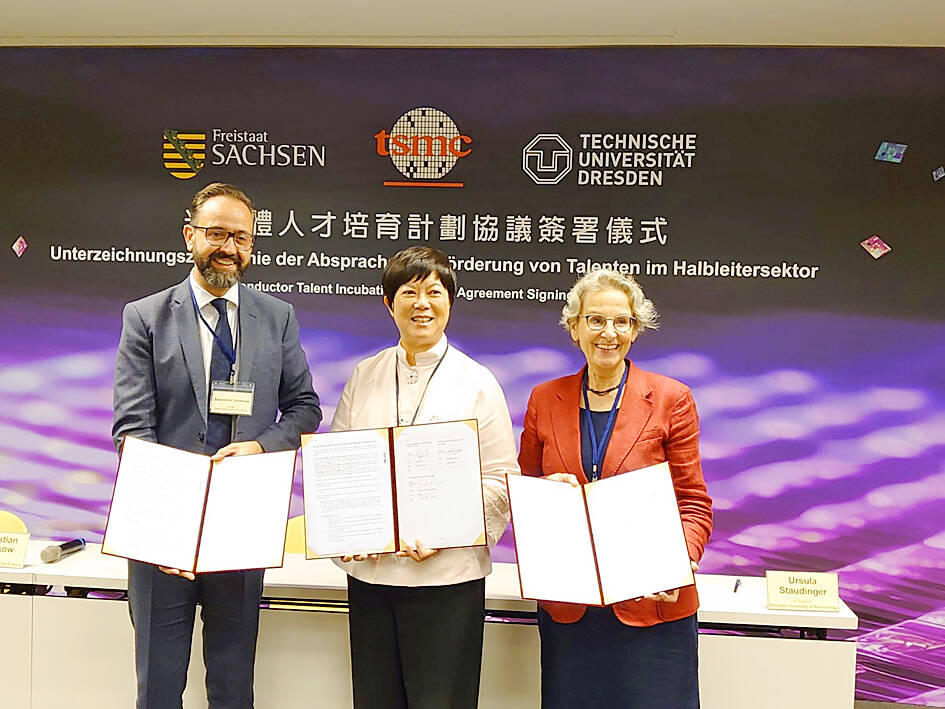Taiwan Semiconductor Manufacturing Co (TSMC, 台積電) yesterday signed an agreement with Germany’s Saxony state government and Dresden University of Technology to jointly launch a semiconductor talent incubation program, with an aim to address a shortage of talent.
The program would be the first overseas talent cultivation initiative financially backed by a local government.
The project came after TSMC, the world’s biggest contract chipmaker, last month unveiled a new overseas capacity expansion plan in Dresden. The chipmaker plans to build a new factory in the German city at the end of 2027, following its expansions in Arizona and Kumamoto, Japan.

Photo: CNA
The Dresden fab is to produce 28-nanometer chips used in vehicles for customers such as Robert Bosch GmbH, Infineon Technologies AG and NXP Semiconductors NV.
“With the global semiconductor market estimated to swell to US$1 trillion in 2030, we have to plan ahead and be well-prepared for a potential talent gap,” TSMC senior vice president for human resources Lora Ho (何麗梅) said. “Enhancing semiconductor education will be a crucial approach to solve shortages of semiconductor technicians worldwide.”
Before finalizing the Dresden expansion plan, the chipmaker has dispatched several human resources executives to Europe to study talent supply and related regulations, TSMC chairman Mark Liu (劉德音) told reporters following the company’s annual shareholders’ meeting in Hsinchu.
TSMC is struggling to recruit enough engineers to support its rapid expansions at home and overseas. The chipmaker is seeking to add 6,000 new employees this year, after enlisting more than 12,000 employees globally last year.
The new talent incubation program would support as many as 100 students a year from 11 German universities to take tailor-made semiconductor courses at Taiwan’s top universities, including National Taiwan University and National Tsing Hua University.
Dresden University of Technology president Ursula Staudinger told a news conference in Taichung that her university is to act as a bridge between the students and universities in Taiwan.
Those students would then take two months of training courses at TSMC’s Newcomer Training Center in Taichung, where TSMC’s overseas employees from the US and Japan are trained.
Saxony plans to allocate about 3 million euros (US$3.2 million) a year to fund the talent incubation program. The first batch of German students are due to arrive in February next year.

Conflict with Taiwan could leave China with “massive economic disruption, catastrophic military losses, significant social unrest, and devastating sanctions,” a US think tank said in a report released on Monday. The German Marshall Fund released a report titled If China Attacks Taiwan: The Consequences for China of “Minor Conflict” and “Major War” Scenarios. The report details the “massive” economic, military, social and international costs to China in the event of a minor conflict or major war with Taiwan, estimating that the Chinese People’s Liberation Army (PLA) could sustain losses of more than half of its active-duty ground forces, including 100,000 troops. Understanding Chinese

The Ministry of Foreign Affairs (MOFA) yesterday said it is closely monitoring developments in Venezuela, and would continue to cooperate with democratic allies and work together for regional and global security, stability, and prosperity. The remarks came after the US on Saturday launched a series of airstrikes in Venezuela and kidnapped Venezuelan President Nicolas Maduro, who was later flown to New York along with his wife. The pair face US charges related to drug trafficking and alleged cooperation with gangs designated as terrorist organizations. Maduro has denied the allegations. The ministry said that it is closely monitoring the political and economic situation

UNRELENTING: China attempted cyberattacks on Taiwan’s critical infrastructure 2.63 million times per day last year, up from 1.23 million in 2023, the NSB said China’s cyberarmy has long engaged in cyberattacks against Taiwan’s critical infrastructure, employing diverse and evolving tactics, the National Security Bureau (NSB) said yesterday, adding that cyberattacks on critical energy infrastructure last year increased 10-fold compared with the previous year. The NSB yesterday released a report titled Analysis on China’s Cyber Threats to Taiwan’s Critical Infrastructure in 2025, outlining the number of cyberattacks, major tactics and hacker groups. Taiwan’s national intelligence community identified a large number of cybersecurity incidents last year, the bureau said in a statement. China’s cyberarmy last year launched an average of 2.63 million intrusion attempts per day targeting Taiwan’s critical

AGING: As of last month, people aged 65 or older accounted for 20.06 percent of the total population and the number of couples who got married fell by 18,685 from 2024 Taiwan has surpassed South Korea as the country least willing to have children, with an annual crude birthrate of 4.62 per 1,000 people, Ministry of the Interior data showed yesterday. The nation was previously ranked the second-lowest country in terms of total fertility rate, or the average number of children a woman has in her lifetime. However, South Korea’s fertility rate began to recover from 2023, with total fertility rate rising from 0.72 and estimated to reach 0.82 to 0.85 by last year, and the crude birthrate projected at 6.7 per 1,000 people. Japan’s crude birthrate was projected to fall below six,